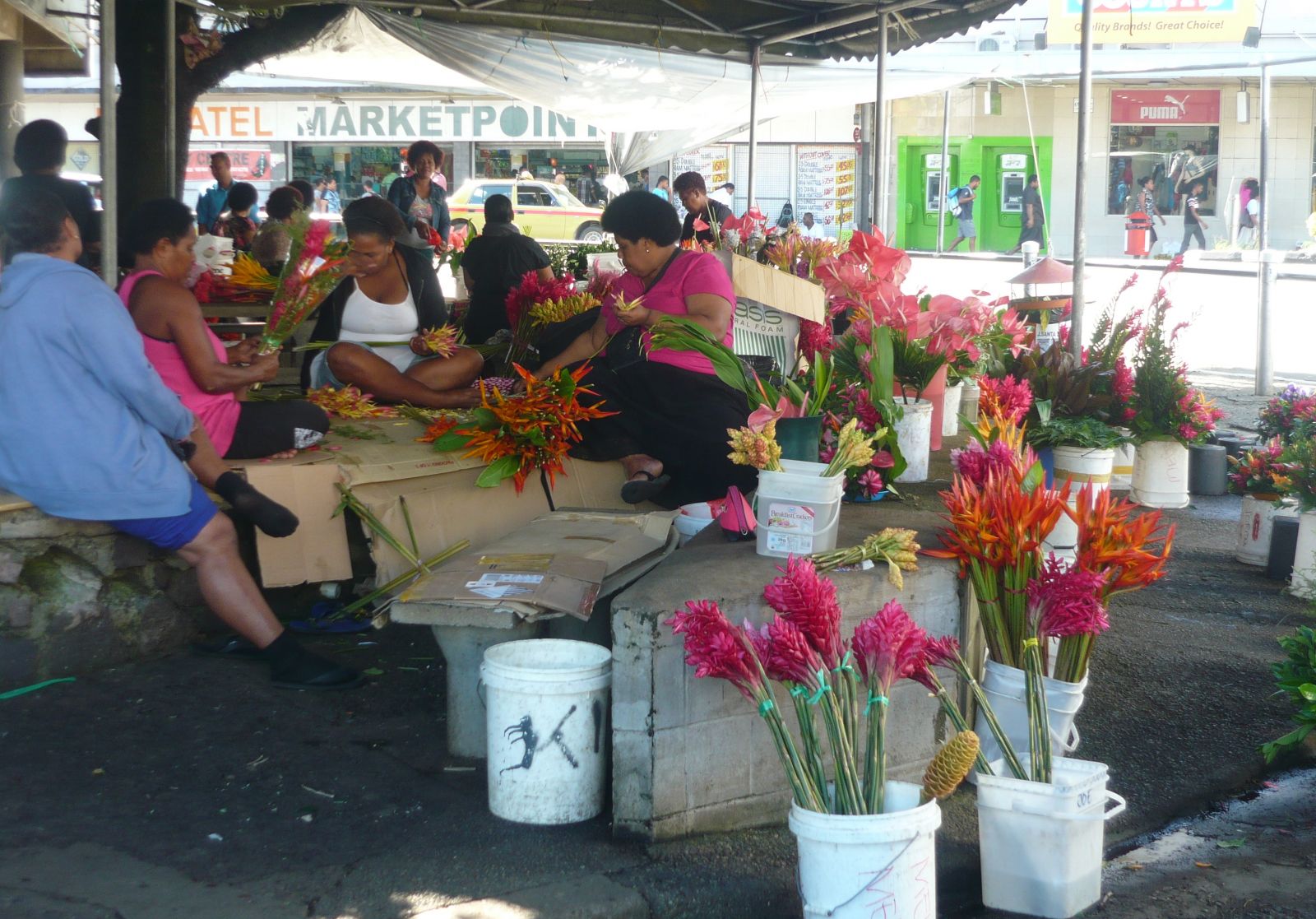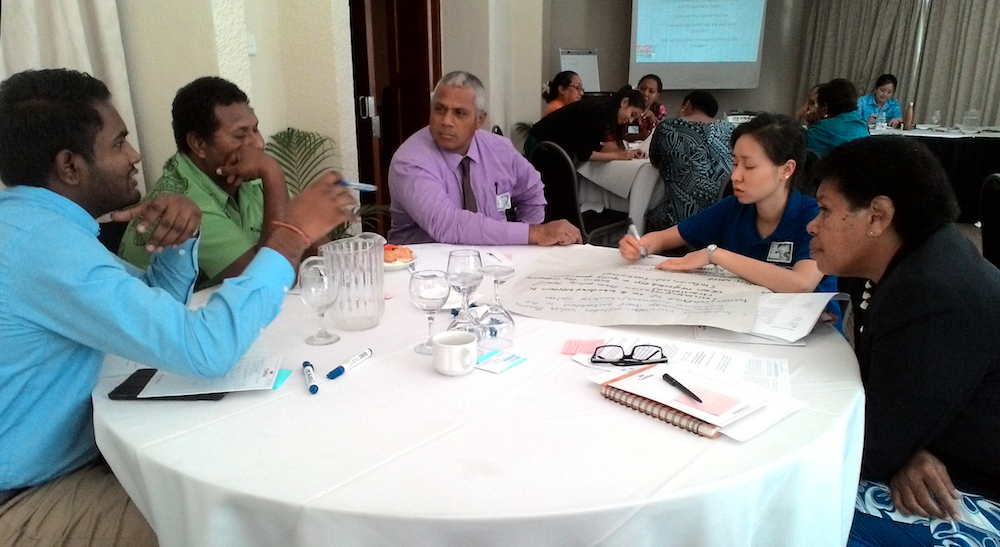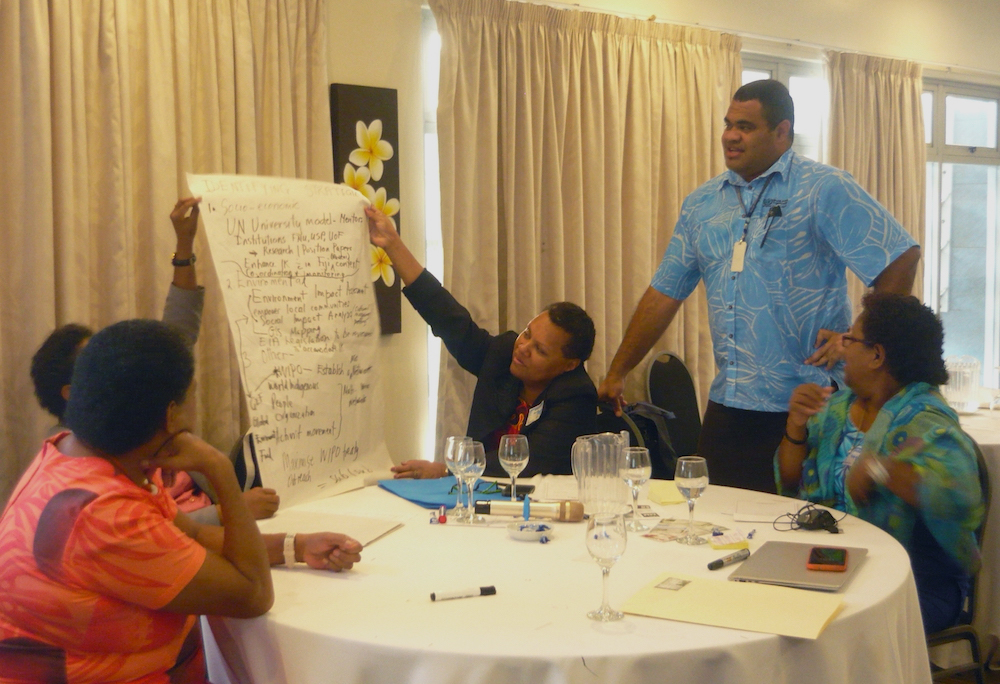Spotlight on SDG Labs: Indigenous knowledge for healthy islands
This is the second in a series of stories that focus on the SDG Labs, a group of prototype projects supported by Future Earth, Stockholm Resilience Centre and The University of Tokyo Integrated Research System for Sustainability Science (IR3s).
To learn about another SDG Lab based in Nigeria, read Trees grow in Kano.
To read about sustainability in the craft beer industry, read Brewing up sustainability.
You can also watch presentations on the SDG Labs given at the 7th International Sustainability Science Conference in August in Stockholm, Sweden. You can find the conference programme here, and the live stream here.
In 2012, residents of a coastal village in Fiji called Vunidogoloa made a drastic decision: Facing worsening floods and storms, the residents moved their entire community, about 30 homes according to news reports, to a site one kilometre inland.
It’s a situation that may become more common in Fiji and other island nations where populations are clustered close to the ocean. The World Bank, for example, reported that climate change could cause economic damages of up to 50 million USD each year just in Viti Levu, Fiji's largest island.

Flowers for sale. Photo: Natasha Kuruppu
On the surface, such environmental crises may not seem like public health concerns. But they are, says Natasha Kuruppu, a Post-doctoral Fellow at the United Nations University-International Institute for Global Health in Malaysia. She says that in Fiji, the health of people is intricately tied to the health of their islands – a concept of human wellbeing that researchers call “planetary health.” One study from Fiji, for example, showed that spikes in temperature, such as those caused by climate change, can drive up incidents of diarrheal diseases like Dengue fever.
To put a spotlight on those links, Kuruppu teamed up with Litiana Kuridrani, a public health specialist at the University of Fiji. They launched a series of conversations this year to explore how the country could improve the health of its people and islands at the same time to meet international sustainability targets. And they took a new approach to that goal: Kuruppu and Kuridrani asked how the knowledge held by Indigenous groups in Fiji could become an integral part of that effort.
Their project was one of more than 20 “SDG Labs” recently supported by Future Earth and its partners to “generate prototype solutions to complex problems.”
“Whether it's in architecture, economics or in other fields, we should be looking at other domains of knowledge, not just Eurocentric or Western-based knowledge,” Kuruppu says. “That’s how I feel about medicine or health. We need to look more broadly.”
iTaukei knowledge
And there is no shortage of knowledge about health among Indigenous Fijians, or iTaukei, who make up about half of Fiji’s nearly one million citizens, says Litiana Kuridrani. She heads the Centre for iTaukei Studies at the University of Fiji.
Traditional midwives, for example, have long held an important role in Fiji. That’s because on this archipelago, people inhabit more than 100 islands, making it difficult for some expectant mothers to get to the hospital. Kuridrani has known traditional midwifes who can readjust a fetus in the breech position – with its feet, rather than head, pointed toward the birth canal. “By small rubbing, the baby automatically turns so that its head can focus down,” she says.

Participants at a May 2017 workshop organised by Natasha Kuruppu and Litiana Kuridrani in Fiji. Photo: Natasha Kuruppu
Health initiatives in Fiji, whether those run by the government or international organisations, could gain a lot from incorporating that knowledge into their work, Kuruppu says.
Take the United Nations Sustainable Development Goals (SDGs), a set of international targets for making the world more sustainable. The third of those 17 goals focuses on human health, seeking, among other things, to lower the percentage of
women who die during childbirth. Kuruppu says that similar health campaigns have failed in Pacific island nations. She says that’s because campaigns didn’t seem relevant to people at the village level. Incorporating Indigenous knowledge could be an effective way of connecting sustainability initiatives to the values and knowledge of Fijians.

A small group discussion at the recent workshop in Fiji. Photo: Natasha Kuruppu
It would also align with policies that many Pacific Islands, including Fiji, have adopted with a focus on “Healthy Islands.” This concept acknowledges that the health of island communities is intertwined with the health of their surrounding environment.
“Everyone is moving toward more evidence-based policies, whereas traditional knowledge is seen looking backward,” Kuruppu says. “This happens in any context, whether it’s health or climate change. Changing minds is always a key barrier.”
To begin to break down that barrier, Kuruppu and Kuridrani held a workshop in May that drew experts from in and out of the country. They included researchers, government officials, representatives from the World Health Organization and religious leaders. During the two-day event, participants discussed what Indigenous knowledge meant to them and how it might help to solve the challenges facing Fiji. Based on those discussions, participants recommended that the government of Fiji put one of its ministries in charge of building Indigenous knowledge into efforts to make the island more sustainable.
In recent years, the government of Fiji has launched efforts to discourage smoking among its citizens as part of a larger campaign to combat non-communicable diseases. Photo: Natasha Kuruppu
And there is some urgency. At the same time as the island nation faces a growing threat from climate change, it has also experienced soaring rates of non-communicable diseases like obesity and heart disease. The reason, in part, is because many Fijians are living in urban settings and no longer have access to their traditional foods like taro and greens for a variety of economic and environmental reasons – instead, many Fijians have turned to imported and processed foods.
“In the next 30 years, non-communicable diseases are going to be a huge issue across many Pacific island nations,” Kuruppu says. “There’s a real need for other ways of knowledge to combat obesity or cardiovascular disease.”
Village clean up
Litiana Kuridrani says that she hopes the workshop, and a subsequent report, will help to raise the profile of iTaukei knowledge in Fiji. “I’m hoping that, as an outcome of our report, the Ministry of Health will take it seriously, to recognise Indigenous knowledge as integral to health system planning.”
One example of how that might look is happening in her home village of Namatakula, a community on the Coral Coast of Viti Levu, the country’s largest island. Kuridrani calls it “the most beautiful part of Fiji.” In August, she traveled back to the village to take part in a series of activities that coincided with the naming of Namatakula as a “green village."
As part of those events, children ran up and down Namatakula's beaches, cleaning up and recycling trash. Kuridrani and other researchers from the University of Fiji also worked with elders to replant shorelines with native trees and other vegetation to protect against floods. And she talked with local fishermen to map out where they catch their fish as a first step toward coming up with a plan to manage those fisheries sustainably.
In other words, everyone from the community participated. That will be an important part of rolling out sustainability initiatives on a wide scale, Kuridrani says – not just in Fiji but in other Pacific island nations like Vanuatu, Tonga, the Solomon Islands and others.
“For Fiji, to achieve success, you have to do it communally,” she says. “In the Western world, it’s much more independent, whereas for us, it needs to be done collectively by the whole village.”
DATE
September 7, 2017AUTHOR
Daniel StrainSHARE WITH YOUR NETWORK
RELATED POSTS
Spotlight on LMICs – Tired of Breathing in Pollutants? Time for Better Fuel Economy and Vehicle Standards
Future Earth Taipei Holds 2024 Annual Symposium
Spotlight on LMICs – The Future’s Juggernaut: Positioning Research as Anchors for Environmental Health